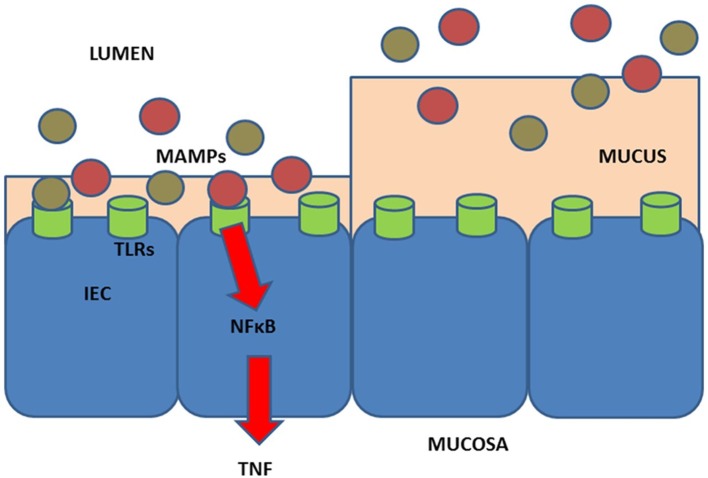Figure 1.
Hypothesis for effects of diet in relation to the development of chronic inflammatory diseases (CIDs). Diet (meat,97 fibre,97 animal fat,98 n-330 and n-6 polyunsaturated fatty acids, vitamins A99 and D,100 carotenoids,101 smoking, gluten102) may affect the immune system103 104 either directly or indirectly via, for example, the activity and composition of the gut microbiome.105 106 The effect of low intake of fibre/high intake of red and processed meat is shown at left: in short, low intake of fibre (which could otherwise serve as a nutrient for the microbes) may lead to the microbial metabolism of mucus and to decrease of the intestinal mucus layer.61 107 108 A high intake of red and processed meat may render the mucus layer penetrable to, for example, bacteria by reducing the disulphide bonds in the mucus network.8 105 109 Thus, microbes may reach the epithelium8 110 111 and activate the immune system.8 112 113 There is some support for such a mechanism in CIDs,8 including findings of; high amounts of sulphate-reducing bacteria in patients with inflammatory bowel disease (IBD)8 111 114; association of high-fibre intake with low risk of IBD among 170 776 participants from the prospective Nurses’ Health Study I8 27; and association of high intake of red meat and total protein and risk of developing inflammatory polyarthritis in the population-based prospective cohort of 25 630 participants from the European Prospective Investigation of Cancer in Norfolk.8 39 40 IEC, intestinal epithelial cell; MAMPs, microbe-associated molecular patterns; NFkB, nuclear factor kappa-light-chain-enhancer of activated B cells; TLRs, toll-like receptors; TNF, tumor necrosis factor. Figure from Christensen et al 8 (copyright 2018 by Vibeke Andersen).

